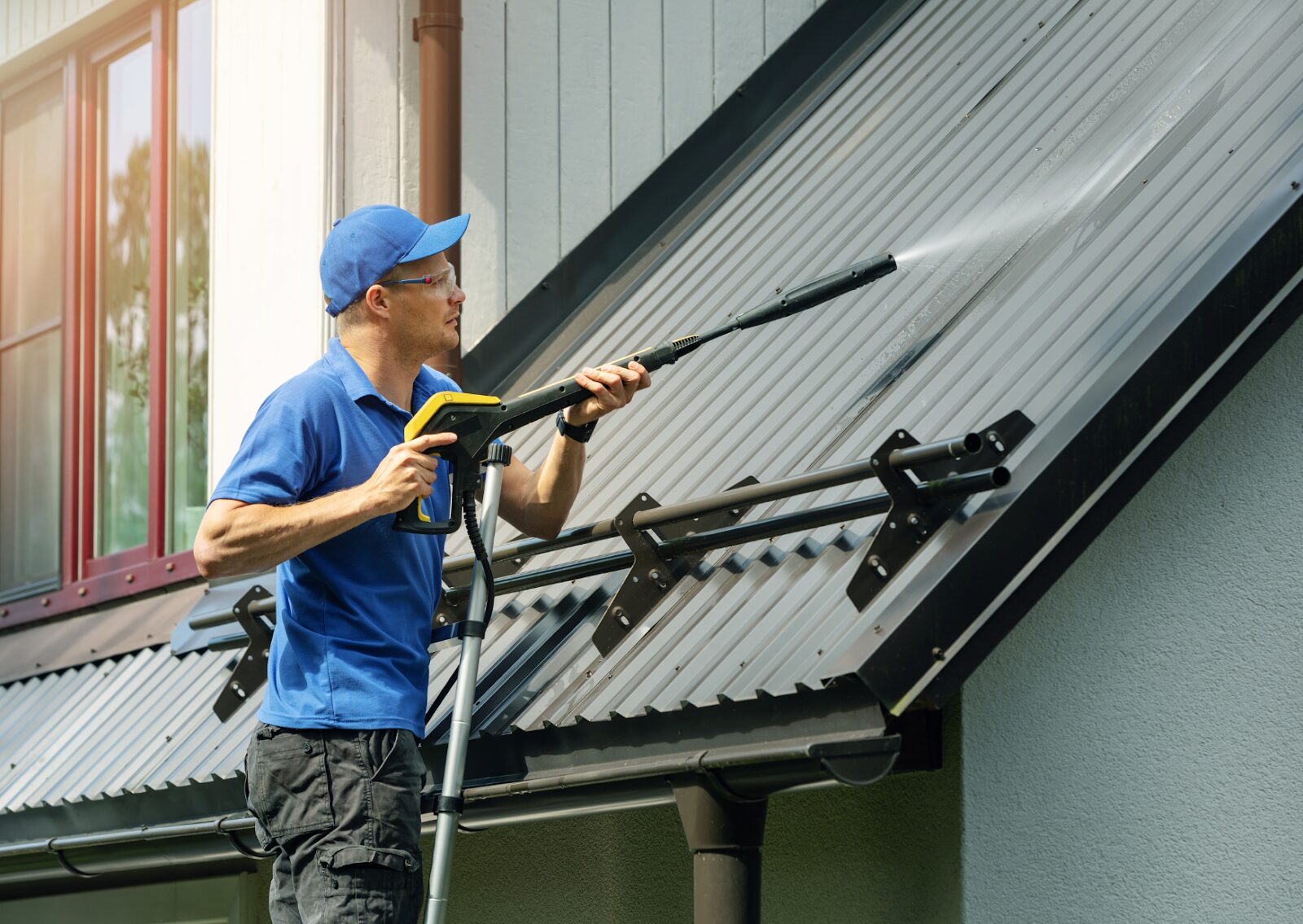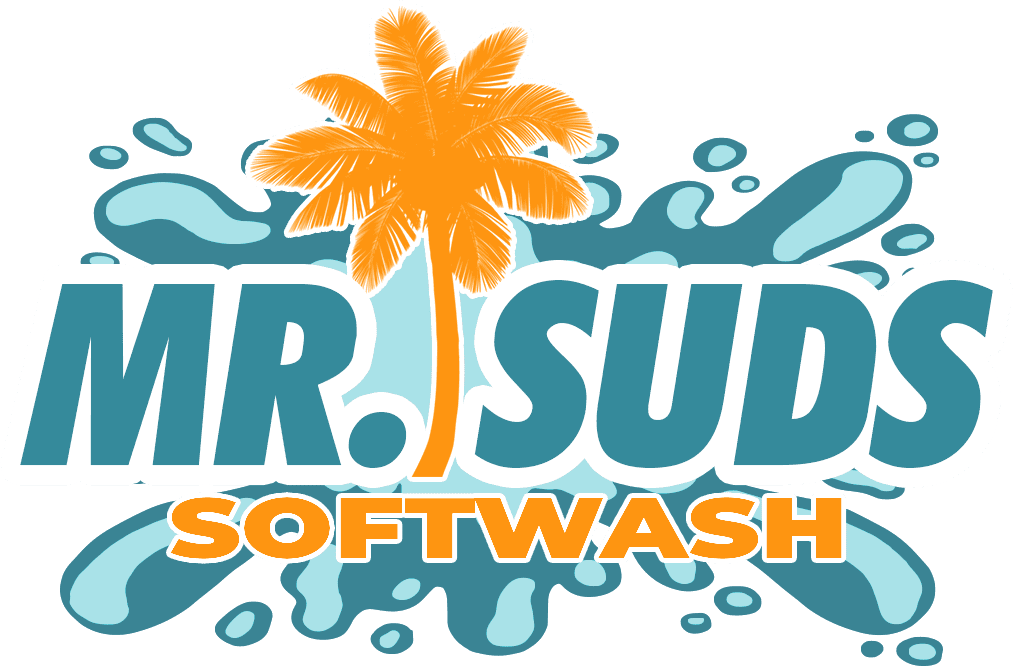Softwashing a roof is a cleaning method that uses low pressure combined with specialized cleaning solutions to safely remove organic materials like algae, moss, mildew, bacteria, and mold from the roof’s surface. Unlike high-pressure washing that relies on forceful water streams, soft washing work uses a gentle spray and biodegradable solution to penetrate and eliminate root systems without damaging shingles, tiles, or other roofing materials. This approach not only cleans but also helps protect and extend the life of your roof.
How Does Soft Wash Roof Cleaning Differ from Pressure Washing?

Soft wash roof cleaning uses low pressure, typically similar to the strength of a garden hose, whereas pressure washing or power washing relies on high pressure to blast away dirt and buildup. Unlike pressure washing, which can strip granules from shingles and damage roofing materials, soft wash cleaning gently applies cleaning solutions that kill organic materials at their roots. This makes it a safer and more effective option for delicate roof surfaces.
Why Do Roofs Develop Algae and Black Streaks?

Many homeowners notice black streaks or stains on their roofs over time. These are often caused by a type of bacteria called Gloeocapsa magma, which thrives in humid environments. This bacteria feeds on the limestone filler in shingles, creating dark streaks that not only look unsightly but can also retain moisture, leading to potential roof damage and decreased energy efficiency. Moss, mildew, and mold can also grow, causing further deterioration if left untreated.
What Are the Benefits of Soft Wash Cleaning?

Soft washing offers several advantages for roof cleaning:
- Prevents damage: Low pressure avoids breaking shingles or tiles and helps protect roofing materials.
- Kills root systems: The cleaning solution eliminates algae, moss, and mold from the roots, preventing regrowth.
- Eco-friendly: Biodegradable solutions minimize harm to plants and landscaping.
- Long-lasting results: A clean roof stays cleaner longer compared to traditional pressure washing.
- Cost-effective: Preventing roof damage saves money by reducing the need for repairs or a new roof.
When Is Soft Wash Roof Cleaning Recommended?

Soft wash cleaning is especially useful for:
- Roofs with asphalt shingles, tiles, or wood that could be damaged by high pressure
- Homes with visible black streaks, moss, or algae
- Roofs where the manufacturer warranties specify low-pressure cleaning
- Properties in humid areas where organic build-up is common
How Is the Process of Soft Washing a Roof Carried Out?

Soft washing typically involves these steps:
- Preparation: Nearby plants are protected to prevent harm from cleaning solutions.
- Mixing solution: A biodegradable cleaning solution is prepared to kill organic materials.
- Application: The solution is applied using low-pressure equipment.
- Dwell time: The solution sits long enough to penetrate and break down root systems.
- Rinsing: Gentle rinsing removes the solution and loosened debris.
- Final inspection: A clean roof is inspected to ensure all stains and buildup are gone.
This process ensures a thorough clean while preserving the integrity of your roof’s surface.
How Often Should Roof Cleaning Be Scheduled?

The frequency of roof cleaning depends on your location and environment. Most roofs benefit from soft washing every one to two years. However, in areas with high humidity, shade, or heavy tree coverage, more frequent cleaning may be necessary to prevent the buildup of algae, moss, and mildew.
What Are the Risks and Safety Considerations?

High-pressure washing can cause significant roof damage, including dislodging shingles, removing protective granules, or forcing water underneath the roofing materials. Soft washing is a much safer alternative, but proper handling of cleaning solutions is essential to avoid harming plants or other surfaces around your home. Professional roof cleaning services ensure safety for both the roof and the surrounding landscaping.
How Is Soft Washing Different from Power Washing?

Power washing typically uses heated water at high pressure to clean surfaces, making it suitable for hard, durable materials like concrete or metal. Soft washing, by contrast, relies on specialized cleaning solutions and low pressure to safely clean delicate roofing materials. This method removes bacteria and stains without breaking or wearing down the surface.
Can Soft Washing Prevent Roof Damage and Extend Roof Life?

Yes. Soft washing not only cleans your roof but also prevents future damage. By killing algae, moss, and bacteria at the root, it reduces moisture retention and prevents decay of shingles and tiles. This protection extends the lifespan of your roof, delays the need for replacement, and maintains its appearance for years to come.
Where Can You Find Trusted Soft Wash Roof Cleaning Services?

Mr. Suds Softwash logo with orange palm tree, blue water splashes, and bold teal and orange text.
For homeowners who want a clean roof without risking damage, professional soft washing is the safest and most effective solution. Visit Mr. Suds Softwash’s website or call today to schedule a soft wash roof cleaning and protect your home’s beauty and value.
Final Thoughts
Soft washing offers homeowners a reliable, eco-friendly, and cost-effective way to clean and protect their roofs. Unlike pressure washing, it uses gentle pressure and biodegradable solutions to kill harmful bacteria and algae, preventing stains and future damage. With proper maintenance and professional service, your roof can stay cleaner for longer, saving you money and ensuring your home remains safe and attractive.
Works Cited
“Soft Washing.” Wikipedia, Wikimedia Foundation, https://en.wikipedia.org/wiki/Soft_washing.
“Roof Cleaning.” Wikipedia, Wikimedia Foundation, https://en.wikipedia.org/wiki/Roof_cleaning.
“The Spruce: What Is Soft Washing?” The Spruce, https://www.thespruce.com/what-is-soft-washing-5218853.
“Things You Should Never Pressure Wash.” Better Homes & Gardens, https://www.bhg.com/things-to-never-pressure-wash-11722800.
“Understanding Gloeocapsa Magma.” McKinney Chamber of Commerce, https://business.mckinneychamber.com/blog/Details/understanding-gloeocapsa-magma-the-menace-on-your-roof-and-how-softwashing-saves-the-day-212015.
Frequently Asked Questions
1. How long does soft wash roof cleaning last?
Soft washing can keep your roof clean for up to three to five years, depending on your location and surrounding environment. Unlike pressure washing, which may only remove surface dirt, soft washing kills algae and bacteria at the root, leading to longer-lasting results.
2. Is soft washing safe for all types of roofing materials?
Yes. Soft washing is designed to be safe for asphalt shingles, tiles, metal roofing, and other delicate materials. It uses low-pressure and biodegradable solutions that clean without causing roof damage or breaking shingles.
3. Will soft washing harm my plants or landscaping?
Professional soft wash companies like Mr. Suds Softwash take steps to protect your landscaping. This includes pre-wetting plants, using eco-friendly cleaning solutions, and rinsing surrounding areas to prevent harm.
4. Can I soft wash my roof myself?
While it’s possible, DIY soft washing is not recommended. Without professional-grade equipment and the right cleaning solutions, you risk ineffective cleaning or even damaging your roof. Hiring experts ensures safety, proper treatment, and lasting results.
5. How often should I schedule soft wash roof cleaning?
Most homeowners benefit from soft washing every one to two years. However, homes in humid or heavily shaded areas may need annual cleaning to prevent algae and mold build-up.

